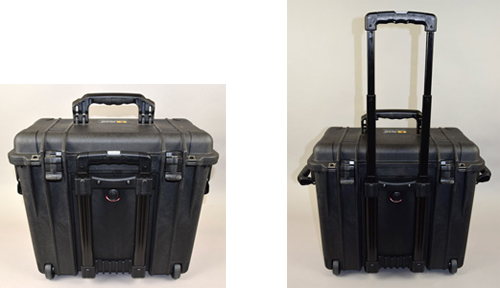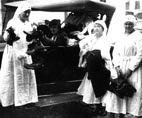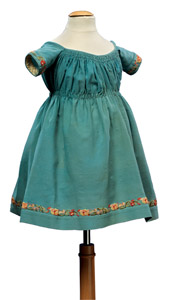Portable Education Program (PEP)
Now you don’t have to come in person to experience the museum; instead, the museum will come to you. Our Portable Education Programs (PEP) travel across the country to visit schools and groups of all ages.
“History is more fun this way, instead of reading text books.” – Fifth grade student, Oregon
Find out how to reserve your PEP today!
For schools and children’s programs, the museum offers three PEPs: School & Play, Money & Jobs, and Food & Clothing. Curriculum is designed for the fourth and fifth grade, though teachers of other grades have successfully used the materials as well.
For DAR chapters and other adult audiences, we offer the PEP called Colonial Household.
PEP: Food & Clothing
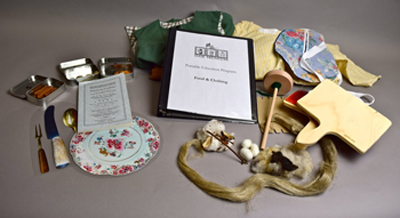
We all need to eat and wear clothes. People in the 18th century did, too... but, their food and clothing were a bit different from ours! Can you follow Colonial table manners? Identify the ingredients used in cooking? Figure out the math involved in a recipe? You could even try a recipe from a Colonial cookbook!
Your dress at the dinner table is important, too. Discover the types of clothing people wore, and explore the process by which raw fibers are turned into cloth. Try your hand at identifying silk, wool, linen, and cotton. Learn important 18th century skills: brushing, spinning, and weaving wool into useful cloth.
PEP: Money & Jobs
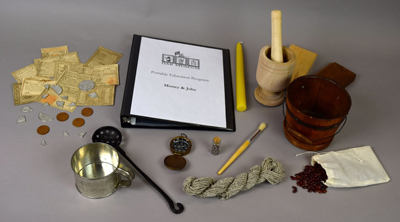
Can you tell a shilling from a bit, or a guinea from a ha'penny? Money in Colonial America came from many different countries, and colonists, who used different monetary systems, had to be adept at arithmetic. Practice your arithmetic using shillings and pence, and figure out fractions with a Spanish dollar.
Then, put your monetary skills to good use when you explore the different jobs people did in 18th century America. Will you be a blacksmith? A weaver? A farmer? Discover the materials these workers used, and how each job was important.
PEP: School & Play
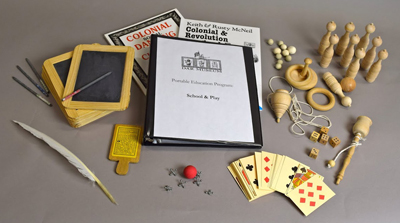
Dive into the world of an 18th century scholar. Children of Colonial America were not taught in the kind of schools like the kind children attend today. Examine writing instruments of the time, and use slates to work out your arithmetic and writing lessons. And, no proper colonial education is complete without music: tap your feet to the popular dance steps of the day, or lift your voice in song.
Then, have recess...Colonial-style! This program includes many games and toys enjoyed by children of the 18th century. See if you can succeed at quoits, try card and dice games, and read the stories that amused children and adults alike during the early years of our country.
PEP: Colonial Household
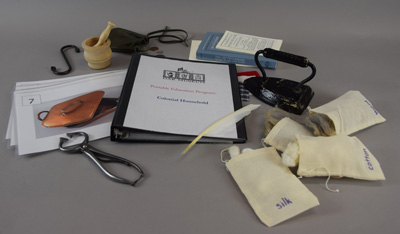
This program is designed for adult learners. With it you can explore the skills needed to run a household during the 1700s. Can you identify different types of fabric when you’re doing laundry? How about cooking tools—would you know what to do with the kitchen gadgets of the colonial days? And what about household expenses—can you calculate how much you would need for the year in pounds, shillings, and pence? These are all skills needed to run a household in the colonial days.
How to Reserve Your PEP
Cost: $40 + return shipping. The reservation fee defrays some of the cost of shipping the PEP to you. You are responsible for the full cost of the return shipment. Shipping costs vary based on your location; check with FedEx for an estimate of a 30-pound box shipped from your location to zip code 20006. If you cancel your reservation up to 30 days in advance, you will receive a refund on the reservation fee; no refunds are given for cancelations less than 30 days in advance. Schools may apply for the reservation fee to be waived by emailing the name of the school, grade and number of students served to [email protected], schools will still need to cover the cost of returning the trunk.
How Far it Travels: The PEPs can go anywhere in the USA.
How Long You Can Keep It: The reservation period is 2 weeks, starting on Tuesdays.
How Many: Each group or class may reserve 1 PEP at a time.
How Does It Arrive: The PEP comes in a hard plastic case (20”L x 11.5”W x 17”H) with an extended handle and wheels. Each one weighs about 25 to 30 pounds.
Questions? Contact [email protected]
